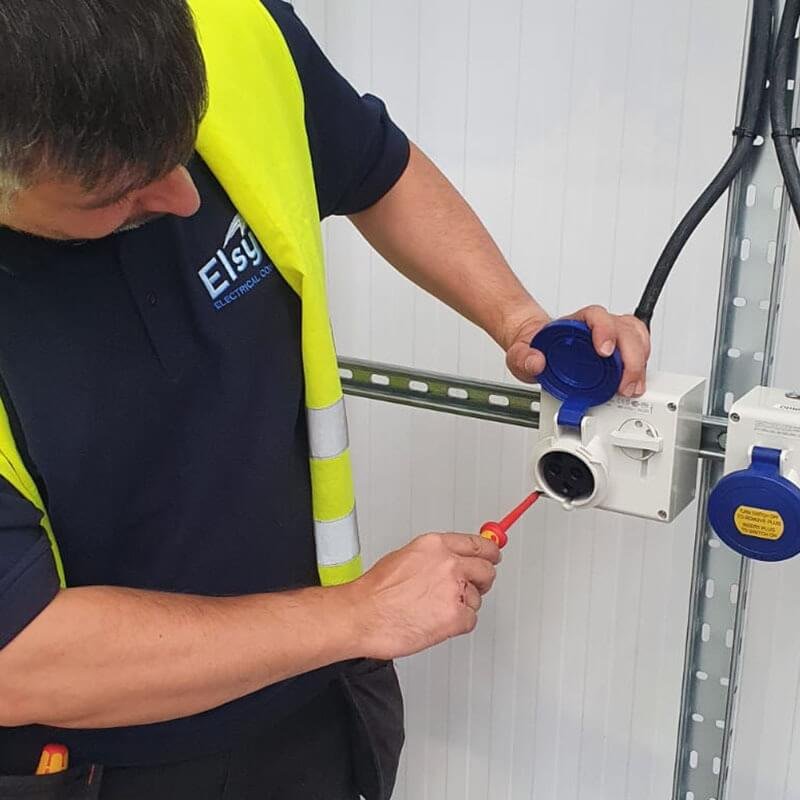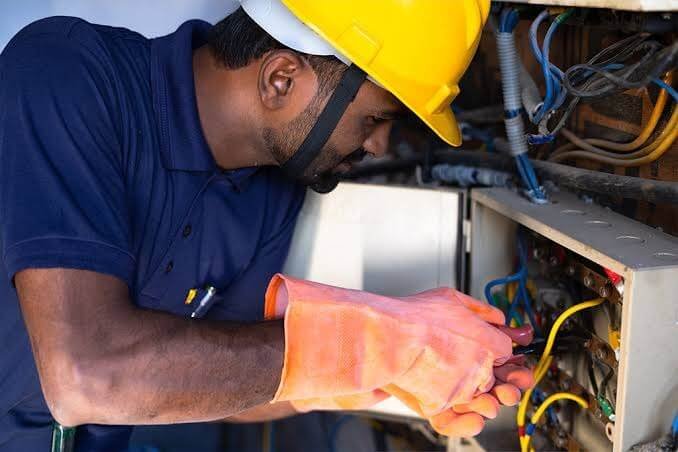The contractor of choice for your facility’s electrical work will determine investment in safety, efficiency, and long-term operational success. Selecting an electrical contractor will be critical for project outcome and operational reliability for your facility, whether you’re planning an extensive industrial installation, upgrading aging commercial infrastructure, or incorporating sophisticated automation systems.
The scope of modern electrical works includes much more than just wiring and basic installations. Power distribution, motor control, building automation, and energy management systems all of which are integrated in modern commercial and industrial facilities need advanced electrical systems. Such a high degree of specialization calls for professionals with a solid and versatile technical expertise and field experience in advanced electrical systems.
Electrical work has a significant potential for serious implications. Safety risks, equipment damage, expensive downtime, and compliance with regulatory requirements are all risks of poor workmanship. The right electrical professional, on the other hand, will ensure the systems work safely, efficiently, and reliably for the long term. Knowing what to look for and what to ask becomes paramount for every informed hiring decision.

Understanding Electrical Licensing and Qualifications
An electrical professional’s credentials are assessed based on their professional licensing. An electrician near me, for example, must go through an educational program, an apprenticeship, and pass multiple exams to receive a license. Moreover, different regions have different criteria for issuing licenses, and knowing these differences makes sure that the practitioners you engage are the right ones for the job.
In addition to the basic license, a number of branches require unique licenses as well. This is the case for industrial electricians who are often qualified to work in motor control, power systems analysis, and industrial safety procedures. Commercial specialists may have building management systems energy efficiency training, or a brand-specific certificate that indicates they are trained on particular devices and systems.
Through the courses and training that are scheduled, licensed professionals are ensured that they will be aware of new codes, devices, and best methods in their field. Electricians who work on their professional development, for instance, through courses, training sessions, or certification renewals by the industry, display a desire to maintain and improve industry standards.
Professional Organizations and Industry Affiliations
Being a member of an electrical professional body shows that you have work done in the field and you have furthered your education. Organizations such as IEEE, NECA, and other regional electrical contractors help their members gain professional competence by offering materials and various professional training.
Certifications from equipment manufacturers look at the qualifications an individual holds from an employer’s standpoint. Certifications from companies such as Schneider Electric, Siemens, and ABB, or other large vendors, showcase unique expertise relevant to the products and systems which are within the scope of the project.
Evaluating Technical Expertise and Experience

These credentials do not cover the basic electrical concepts, but rather the specialized knowledge tailored to your project needs. Industrial plants need available staff who possess knowledge of intricate systems such as: motor control, advanced power quality, and industrial safety. Commercial offices often demand specialized knowledge in building systems such as: the integration of automation controls, energy systems, and other cooperating building trades.
An individual’s past experience with similar jobs serves as the best benchmark for assessing an electrician’s ability to meet your needs. Request thorough descriptions of similar jobs, along with the project scope, problems encountered, and the solutions provided. Recommendations from similar jobs done can lend additional insight into technical skills and ability to manage projects.
Knowledge of power systems becomes more critical for facilities equipped with advanced electrical systems. Knowledge of load calculations, fault analysis, power factor correction, and harmonic mitigation transforms a simple installation into an advanced electrical system which performs and operates with optimized efficiency.
Specialization in Advanced Technologies
Modern electrical installations are integrating more and more advanced technologies which require specialized knowledge and experience. For example, variable frequency drives (VFDs) and programmable logic controllers (PLCs) as well as building management systems, are technologies that require specialized knowledge.
As businesses and manufacturers try to take control to optimize their processes, automation system integration becomes a necessity. While electrical contractors who specialize in industrial automation have ample experience in integration, they also can help in the design phase to ensure proper integration between electrical and control system components.
Project Planning and Management Capabilities
The scope of electrical projects entails a combination of and significant technical knowledge and experience with good planning to ensure the project runs smoothly in the intended time. Proper estimation of project scope, detailed planning, defining milestones, and a comprehensive communications plan need to be well designed ahead of time.
Communication has become central and crucial to the success of the project. For complex installations, multiple contractors and stakeholders need to be involved and, more often than not, simultaneously. Clear and timely reporting, explaining with updates and inter-discipline coordination, avoiding miscommunication, and ensuring timelines are met directly contributes to a project’s success.
Quality electrical specialists systematically document every aspect of a project, from detailed system drawings to specification sheets, test results, and comprehensive maintenance recommendations. These documents enable long-term, reliable system troubleshooting and aid in effortless future maintenance. Such practices reflect pertinent industry and professional benchmarks. Autumn
Coordination with Other Professionals
To aid in the completion of their scope of work, many electrical projects necessitate collaboration with architects, engineers, general contractors, and other specialists. Professionals with strong collaboration and communication skills expedite the integration of the electrical work, which facilitates seamless incorporation into the larger project.
Familiarity with the construction schedule, building codes, and other legal stipulations allow electrical professionals to foresee issues and take measures to mitigate possible delays and other complications. These factors also enhance the overall success of the project and improve the client’s experience.
Safety Standards and Risk Management
Working with electricity entails safety hazards that necessitate a comprehensive safety management plan and strict adherence to established safety regulations. Electricians are obligated to possess a strong command of electrical safety codes concerning personal protective equipment, workplace hazards, and safety signage.
Safety is an indispensable aspect of professional standards and risk management. Focus on professionals that actively improve their safety records, actively partake in safety training, and maintain safety management systems above the prescribed legal safety standards.
The capabilities for responding in an emergency are critical for industrial and commercial facilities because operational disruptions might arise as a result of electrical failures. Evaluate other businesses as partners by determining their ability to quickly resolve urgent matters and their troubleshooting skills on complex electrical issues.
Regulatory Compliance and Code Knowledge
Like all other electrical codes and regulations, compliance requirements have to be up to date, meaning all professionals need to have appropriate knowledge and follow all of the compliance standards. Local regulations for the national electrical codes, and industry-specific standards all drive the correctness of an electrical installation.
As with all other professionals, a professional electrician needs to know all the compliance regulations related to electrical installations and remediations. This establishes a regulatory inspection process for all compliance installations that are up to standard for a business and can be utilized without delays.
Equipment and Technology Resources
Electrical installations, as other modern industries, need modern sophisticated instruments that can give precision in diagnosis and quality of remediations in the work. Evaluate other electrical partners with regard to the power of modern diagnostic equipment, special tools and other types of testing.
There are tools such as power and quality analyzers, thermal imaging cameras and other multimeters that make the work of diagnosing the system more accurate that need to be specialized. Business and complex industrial projects may need access to specialized tools, special construction instruments and lifting devices.
The right software tools for a project’s design, analysis, and documentation can improve project precision and execution. Through computer-aided design, with the help of project management systems, load analysis software, and others, electrical work can be checked to confirm it complies with the specifications and integrates seamlessly with the project scope.
Testing and Commissioning Services
Electrical systems must be tested and properly commissioned to ensure they’re working safely and efficiently. Tests of the system functions and processes, and commissions along with other relevant documentation should be done to guarantee the proper system performance verification.
Besides the aforementioned documentation, commissioning services can also provide operator training, procedure development, and set maintenance schedules which are designed to aid the system for long-term reliability. These system enhancement services improve facility and operational systems performance and reliability and aid in maximizing value from the electrical system investments.
Quality Assurance and Warranty Provisions
The confidence a manufacturer has in the services and materials rendered can be demonstrated through quality assurance processes and warranty provisions. The assurance and warranty of materials and labor for a certain period of time indicates commitment to customer satisfaction.
During the ongoing project, a set of quality control procedures must be followed to ensure proper specifications, and performance, is achieved. Civilians are encouraged to engage in regular inspections, the execution of prescribed testing procedures, and documentation to improve the quality of outcomes and to reduce challenges.
Timely follow-up services and continuous support show dedication to maintaining long-standing client collaborations and optimizing system functionality. Professionals who offer emergency response services and technical support add value long after the initial installation work is completed.
Performance Guarantees and Service Level Agreements
Some electrical professionals offer performance guarantees or service level agreements that provide additional assurance of system functions and responsiveness. These guarantees extend support to essential maintenance checks and reaffirm commitments to routine system evaluations. These agreements reinforce confidence in the workmanship and support provided.
Service level agreements are a game changer for mission critical sites that rely heavily on electrical systems that require constant uptime. These agreements detailing response and repair times provide assurance that electrical problems are tended to swiftly and efficiently.
Cost Considerations and Value Analysis

Although cost is a key consideration when hiring services, prioritizing the cheapest option tends to lead to the worst results. Consider the overall value proposition instead, including service quality, warranty provisions, and ongoing support capabilities.
Transparent pricing structures with detailed estimates mitigate unplanned expenses. However, be cautious around estimates that are significantly lower than expected. Such estimates are often the result of unqualified personnel, inexperience, or miserable efforts to meet arbitrary budget constraints, and are bound to lead to project cost overruns when construction begins.
Services such as energy audits, efficiency recommendations, operator training, and energy efficiency assessments merit a closer look, as they provide further value and justify a higher upfront price. Think about the value in making a purchase over time as in keeping the energy efficiency, maintenance, and operational costs in check over the usable life of the asset, rather than just the upfront payment.
Making the Final Selection Decision
For determining the electrician near me, the search should consider the basic criteria and the more relevant soft criteria, professional attributes, and value beyond pricing and technical skills. For assessing these attributes, arrange in person interviews. This helps in determining the soft skills and professional traits.
Reference checks provide insights into a person’s performance, client satisfaction, and solving issues in a project. Document and ask past clients of the professional’s work on his performance in the aspects of project and timeline, budget, and his work on the project.
For a successful electrical partnership, trust and confidence are important pillars. Select a professional who has the attributes of transparency and no hidden agendas, and cares about the client. The electrical partner should provide value similar to a trusted advisor who helps in answering the difficult questions.
Conclusion
Every electrician has his own set of skills. In turn, these skills require the one hiring to give careful consideration beyond just competitive pricing. Aside from technical skills, the electrician’s safety practices, project management skills, and support from previous projects also add value.
There is a need to select the electrician with the right skills due to the level of complexity that modern electrical requires. The current installations incorporate a broad range of services, from motor control and power distribution to building automation and energy management, demanding professionals with a grasp of traditional electrical principles as well as the avant-garde technologies that impact performance and efficiency.
Hiring the right electrical professional always bears better project outcomes, safety, cost saving in the long run, and system performance. Make thorough evaluations on the potential partners, check their references, and weigh the complete value.
Best value for electrical infrastructure needs come from electrician companies near me with demonstrated excellence, proven track records, and comprehensive capabilities. Partnering with the best enables the transformation of electrical systems from mere infrastructure to strategic business assets that foster operational excellence.
IET is the leading electrical engineering company in East Africa. For more than 75 years, we have helped businesses in Kenya, Uganda, and Tanzania improve the performance of their facilities with innovative and cost-effective solutions. We have successfully completed projects in power transmission and distribution, industrial automation, sophisticated motor control systems, and building management systems. IET has more than 150 employees, including skilled professionals in various specialties.
Whether a complex commercial or industrial project, IET has the experience and the commitment to provide the highest quality of services. To learn more about how we can use your challenges with your electrical infrastructure systems and turn them into competitive advantages, reach out to us now.
